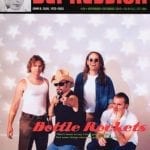Rodney Hayden – A keen sense of country
Rodney Hayden has everything it takes to be a mainstream country music star. He’s got neotenous good looks, a beautiful country voice comparable to Mark Chesnutt or George Strait, and he’s got a great story of how he was discovered.
When he was 17, Hayden sent a demo tape to Robert Earl Keen, one of his musical heroes. “I always loved Robert Earl Keen and I thought, ‘Why not give it a shot,'” he recalls. “I guess I was just lucky that they took the time to listen to the tape.” It was actually Keen’s wife, Kathleen, who recognized Hayden’s talent and convinced Robert Earl to sign Hayden to his management company, Rosetta Management. Prior to signing Hayden, the company handled only Robert Earl’s career.
Keen is quick to sing the young man’s praises; he tells the various Nashville labels to whom he has plugged Hayden that “there is always room in country music for country music.” For his part, Hayden gives much of the credit for to his formative influences.
“I was fortunate enough to grow up listening to Merle Haggard, George Jones and Vern Gosdin,” he says. “I learned from them. My favorite artists today are guys like George Strait and Alan Jackson. They prove that it’s still possible to make real country music.”
Many young musicians have benefited from Keen’s mentoring, but his support for Hayden has been particularly involved. Keen helped write “Get On Your Mule And Ride” on Hayden’s new album, Living The Good Life (released in September on Audium Records), and Hayden often joins Robert Earl onstage. Rich Brotherton, longtime guitarist in Keen’s band, produced Hayden’s new album and co-produced his 2002 debut, The Real Thing.
Perhaps most significantly, Keen’s bassist, Bill Whitbeck, shares writing credit on all of Hayden’s originals from his two discs. “We just clicked from the first time we met,” Hayden says of Whitbeck. “I’m a Merle Haggard fan, but Bill’s a Merle Haggard fanatic.”
Yet Hayden is not a Keen clone. His music is purposefully geared toward the mainstream, whereas Keen seems to avoid clear-cut musical categories and stay one step ahead of his fans. Keen’s voice is charmingly gruff; Hayden’s is smooth with just enough drawl to reveal he’s from Texas.
As a songwriter, Hayden doesn’t follow the path of Keen story-songs such as “The Road Goes On Forever”. Instead, he writes about his small hometown of Pleasanton, Texas (“Goodbye To My Hometown”, “Trying To Find Myself”, “Can’t Wait To Get Back Home”), and about love (“The First Day”, “I’ll Give You Love”). His music is on par with the few good songs coming out of major-label Nashville today, but because he writes his own music, there is an authenticity and sincerity to his work that is absent from the mass of mediocrity that dominates Music Row.
Hayden’s musical roots stretch beyond classic country music; his influences are varied, and well sought out. On his debut, Hayden covered songs by Chip Taylor (“The Real Thing”), Robbie Fulks (“Tears Only Run One Way”), Billy Joe Shaver (“Black Rose”), and Tom Waits (pretend “I Hope That I Don’t Fall In Love With You” actually took place in a Texas honky-tonk). One of the highlights on Living The Good Life is the Slaid Cleaves/Rod Picott tune “Broke Down”, the title track of Cleaves’ stellar 2000 release, which Hayden calls “one of my favorite records. I went a long time where I didn’t listen to anything else.”
Hayden maintains that while he has his eye on the big time, his feet are planted firmly on the ground. Even though he has put out two albums and plays some of the best country music venues in Texas, he still lives with his parents in Pleasanton: “It makes it a whole lot easier to pay the bills that way.”




